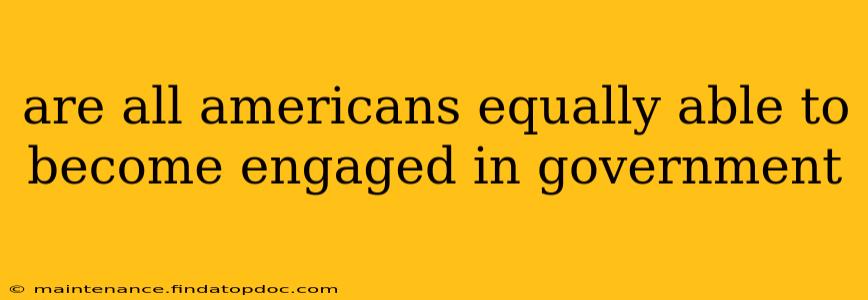Are All Americans Equally Able to Become Engaged in Government?
The ideal of American democracy rests on the principle of equal participation. However, the reality is far more nuanced. While all Americans theoretically have equal ability to engage in government, significant barriers prevent equitable access for many. This essay will explore the factors contributing to unequal engagement, examining the disparities and exploring potential solutions.
What are the main obstacles to equal participation in government?
Several significant obstacles impede equal engagement in government for all Americans. These include:
-
Socioeconomic disparities: Income inequality significantly impacts political participation. Individuals with lower incomes often lack the resources – time, money, and access to technology – necessary for effective political engagement. They may struggle to afford campaign contributions, travel to meetings, or dedicate time to political activism, all of which limit their ability to influence policy.
-
Racial and ethnic discrimination: Historically and presently, racial and ethnic minorities face systemic barriers to political participation. This includes voter suppression tactics, gerrymandering, and implicit bias within the political system. These barriers can create feelings of disenfranchisement and discourage participation.
-
Geographic location: Rural communities often have limited access to information, resources, and political representation compared to urban areas. This geographic disparity can lead to lower voter turnout and less political engagement overall.
-
Language barriers: For non-English speakers, navigating the complexities of the American political system can be significantly more challenging. A lack of translated materials and language support limits their ability to understand political issues and participate in political processes.
-
Access to Information and Technology: The digital divide exacerbates existing inequalities. Limited access to reliable internet and technology prevents many Americans from participating in online political discussions, accessing vital information, or engaging with digital campaign tools.
-
Voter ID Laws and Registration: Strict voter ID laws and complicated registration processes disproportionately affect marginalized communities, making it more difficult for them to exercise their right to vote.
How does unequal access to resources influence political participation?
Unequal access to resources directly translates to unequal political participation. For example, individuals with limited financial means are less likely to donate to campaigns or political organizations. They may also face barriers to participating in political events, such as rallies or town hall meetings, due to transportation costs and time constraints. The lack of resources can silence the voices of many Americans who might otherwise contribute valuable perspectives to the political discourse.
What are the implications of unequal engagement in government for the health of democracy?
Unequal engagement undermines the principles of democracy. When certain segments of the population are systematically excluded from political processes, the government becomes less representative of the people it governs. This can lead to policies that don't address the needs of all citizens, fueling social unrest and further marginalizing already vulnerable populations. A healthy democracy requires active participation from all its citizens, regardless of background or circumstance.
What steps can be taken to promote more equitable engagement in government?
Addressing the issue requires a multi-pronged approach. This includes:
-
Implementing policies that reduce socioeconomic inequalities: Investing in education, affordable healthcare, and living wages can level the playing field and empower more Americans to participate in the political process.
-
Enacting legislation to combat voter suppression: Eliminating restrictive voter ID laws and ensuring accessible registration processes are crucial for ensuring all eligible citizens can vote.
-
Increasing funding for civic education: Comprehensive civic education programs can equip citizens with the knowledge and skills needed to engage effectively in government.
-
Promoting multilingual resources and services: Providing access to information and government services in multiple languages is essential for ensuring the inclusion of non-English speakers.
-
Expanding access to technology and the internet: Bridging the digital divide is essential for ensuring everyone can participate in online political discussions and access crucial information.
-
Encouraging diverse representation in government: Increased representation from diverse backgrounds can lead to policies that are more inclusive and responsive to the needs of all citizens.
In conclusion, while the ideal of equal participation in American government is enshrined in its founding principles, significant barriers remain. Addressing these systemic inequalities requires a concerted effort from individuals, organizations, and government to ensure that all Americans have an equal opportunity to engage in the democratic process. Only then can we truly realize the promise of a government "of the people, by the people, and for the people."
